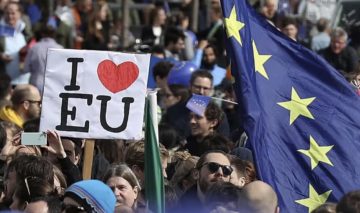Hans Kundnani at The Guardian:
 Many “pro-Europeans” – that is, supporters of European integration or the “European project” in its current form – imagine that the European Union is an expression of cosmopolitanism. They think it stands for diversity, inclusion and openness. It opposes nationalism and racism. It is about people “coming together” and peacefully cooperating. It is a shining example of how enemies can become partners and how diversity can be reconciled with unity.
Many “pro-Europeans” – that is, supporters of European integration or the “European project” in its current form – imagine that the European Union is an expression of cosmopolitanism. They think it stands for diversity, inclusion and openness. It opposes nationalism and racism. It is about people “coming together” and peacefully cooperating. It is a shining example of how enemies can become partners and how diversity can be reconciled with unity.
As the European Commission president José Manuel Barroso put it when the EU was awarded the Nobel Peace prize in 2012 as it struggled to deal with the Eurozone crisis, the European project has shown “that it is possible for peoples and nations to come together across borders” and “that it is possible to overcome the differences between ‘them’ and ‘us’.”
However, there is something rather Eurocentric in thinking of the EU in this way. In particular, by generalising about “peoples and nations” in the way Barroso does, it mistakes Europe for the world.
More here.
